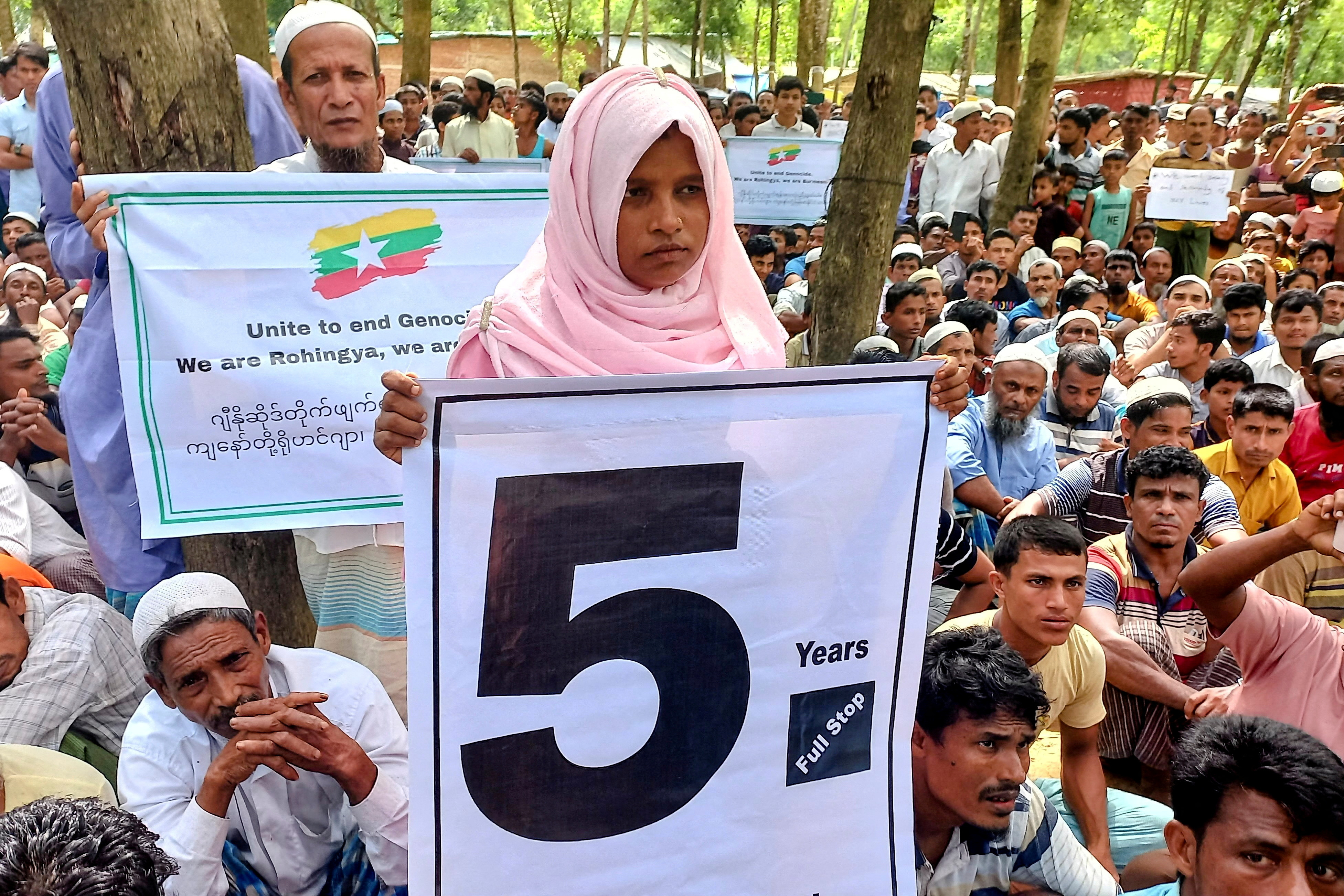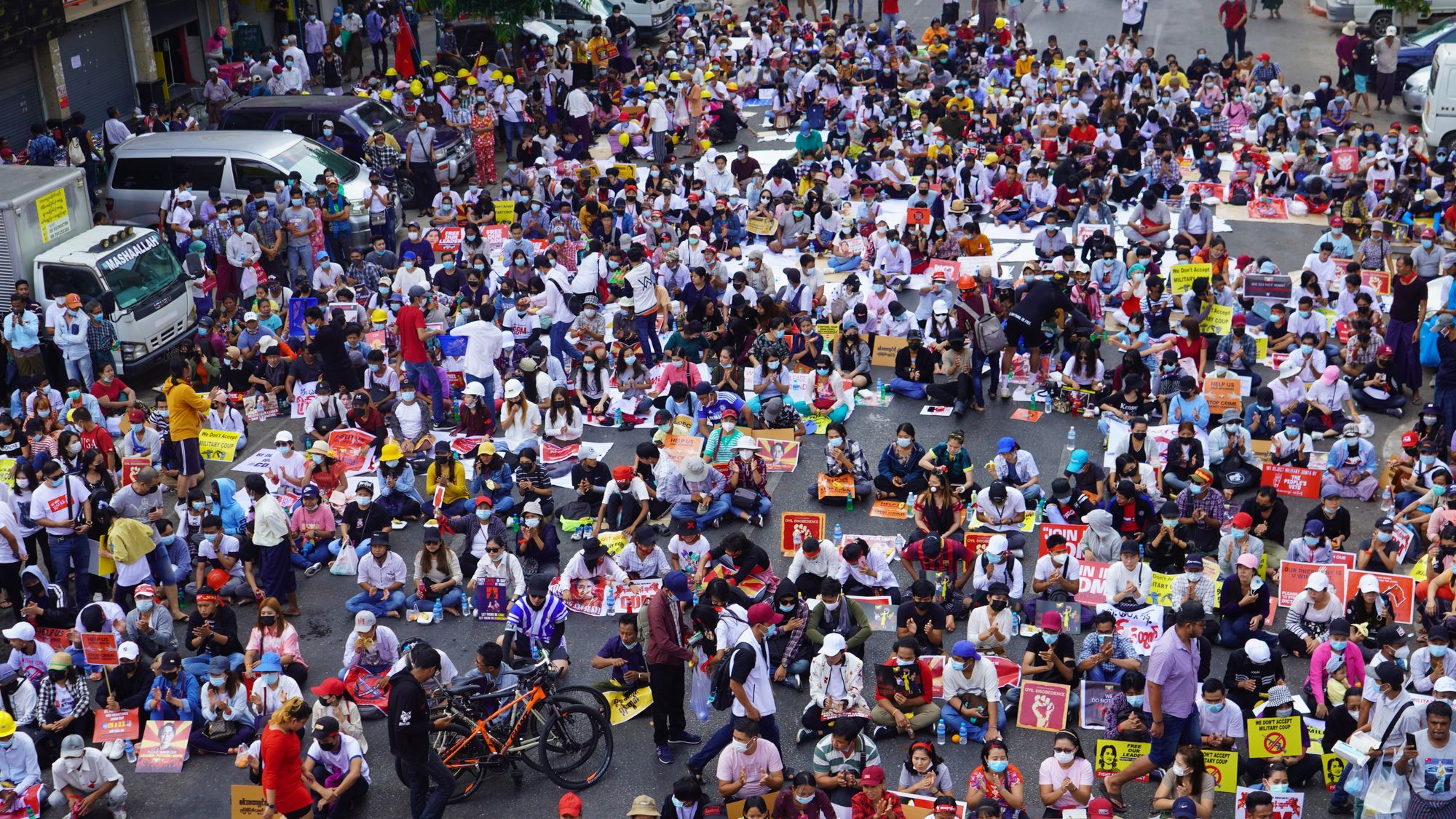While the world's attention is fixated on the escalating NATO-Russia proxy war taking place on Ukraine's soil, with its nuclear saber-rattling and domino effect on the world's economy, on Burma's western front, the decades-old triangular conflict deserves some serious attention as the deeply troubled country's civil war has widened to engulf external powers, including the neighbouring country of Bangladesh.
This appears to be a case wherein one of Burma's key actors, namely the Arakan Army (AA) – with its Buddhist Rakhine nationalist base – is replicating Vladimir Putin's tactical moves in Ukraine.
The AA is a separatist ethnic militia estimated to be 30,000-strong, and has been equipped with Chinese-made weapons. Its ethno-political base of Rakhine known for their genocidal racism and collaborative deeds against the Rohingya – reportedly base themselves among Rohingya villages – as opposed to their own Buddhist communities from which the AA draws its rank-and-file fighters.
Rohingya activists in the diaspora have kept quiet about this deeply troubling development – that the AA have encamped themselves among Rohingya communities. Some tried to give the impression of impartiality that Rohingyas were being caught in the "crossfire" between the AA and the genocidal Burma Army. Understandably, Rohingyas are between a rock and a hard place – insofar as the collaborators in genocide against their communities are now fighting ferociously against each other.
But that silence, and that "crossfire" narrative, came to a loud end when a Rakhine sniper killed Shekul Islam, a 45-year-old Rohingya community leader and educator who happened to be a close relative (uncle) of Wai Wai Nu, a celebrated human rights activist.
Khaing Thukha, the AA spokesperson, denied responsibility for the killing and shifted the blame onto the Burma Army while speaking to RFA Burmese on Oct. 9. Tun Khin, president of the UK-based Burmese Rohingya Organization – UK (BROUK), took to Twitter: "Having spoken to the sources on the ground, it is clear that AA is responsible for (the) killing …."
The problem is incomparably bigger than the murder of a Rohingya leader and which party – the AA or the Burma Army – was behind the killing. Rather, it is the evidently sinister use of Rohingya villages and neighbourhoods along the Burma-Bangladesh border, as the chosen battlefield.
Throughout my recent travels in the former Yugoslavia, I have had numerous in-depth discussions with my scholar friends who survived the "Balkanization" where ethno-religious triangular politics – among the Orthodox Serbs, Catholic Croats and Muslim Bosnians (or Bosniaks) – had produced nasty genocidal violence and concentration camps in the early 1990s. Some of them are now experts on the ethnic conflicts in their ancestral homelands.
According to one scholar who specializes in paramilitaries and mercenaries across the Slavic regions – North and South (including Ukraine) – Putin has deployed the tactics of placing pro-Russian separatist militias in the civilian neighbourhoods of the Donbas region, where administrative buildings – including police and security stations – are mixed in with civilian homes and business. The move, explained my scholar friend, was designed to lure Ukraine's infamous neo-Nazi Azov regiment on to the battlefield.
It worked as Moscow had anticipated. The Ukrainian Azov-commanded units launched a counter-offensive against the separatist militias, having killed an unknown number of Russian-speaking civilians. The Azov units handed Putin the much-desired evidence, which Moscow then used to make the case at the UN that the Russian Federation was acting as the benevolent protector of the Russian population in Ukraine bordering Russia. To be sure, no two parallels are identical in international politics or history of conflicts. Actors and contexts differ.
The Rakhine separatist militia AA's reported use of Rohingya villages in Maungdaw Township as their temporary bases immediately adjacent to Bangladesh has become home to an estimated one million Rohingya genocide survivors. This strikes me as remarkably similar to Putin's cold-blooded, calculated, use of Russian civilians in the separatist Donbas region of Ukraine.
In Burma, I have spent the last decade arguing that the genocide perpetrated against the Rohingyas can only be fully understood as the culmination of the triangular ethnic power struggle among the three primary parties in the conflict. The Burmese central government, both civilian and military, the Buddhist Rakhine, who make up roughly two-thirds of the population in the strategic coastal region (with their decades-old independence aspirations), and the predominantly Muslim Rohingyas whose mass exodus in 2016 and 2017 have been a topic of international judicial and policy concern among UN bodies (such as the International Court of Justice, or ICJ, and the International Criminal Court, or ICC, the UN Human Rights Council, along with technical agencies like the UNHCR), along with the UN Security Council, namely China and the U.S.
In the last and largest wave of genocidal violence against the Rohingya in 2017, both local Rakhine extremists and the Burma Army joined forces to ethnically cleanse the Rohingya Muslim villages, towns and cities. The Rohingya are forced to live in segregated neighbourhoods similar to those in Northern Ireland during the Troubles (between Protestant Unionists and Catholic Republicans).
Because the global judicial processes have focussed on Burma's central role in perpetrating genocide, more specifically in 2016 and 2017, anti-Rohingya and anti-Muslim Rakhine nationalist leaders have busied themselves, reinventing their local communities as "justice-minded."
The AA leadership has reportedly handed over one or two Burma Army defectors, whom they had captured alive, to UN investigators while dimming the light on their active complicity and collaboration five years ago. But now they are fighting for their (Rakhine) independence.
But irrespective of which Rakhine nationalist leader or organization is in the driver's seat of the separatist movement, what universally undergirds its ethno-religious nationalism is the view that the majority Rakhine Buddhist population are the only indigenous or "sons of the fatherland" and hence the rightful owners of the region.
Through this mono-ethnic nationalist lens, the rest of the region's inhabitants such as the Muslims, including the Rohingya whom Rakhine Buddhists outnumber by three-to-one, are "guests" or "migrants" from Bangladesh. As a matter of fact, while promoting itself as a modern, liberal pro-human rights group, the Rakhine nationalists in the media as well as the senior leadership of the AA have refused to allow them to self-identify as Rohingya. Strikingly, the Rakhine nationalist sentiments and views are no different from the Bama nationalist discourses, popularized across Burma's dominant Buddhist society and institutionalized within the Burma Army.
The AA Commander-in-Chief Twan Mrat Naing, formerly a Thailand-based English-tour-guide-turned-separatist-leader, has cleverly outfoxed the Bama leadership in terms of its propaganda aimed at human rights-sensitive audiences (that is, the international media, the UN, and foreign governments).
You have to give it to Rakhine separatist media strategists for their brilliant manipulation of international concerns of Rohingya genocide survivors. They have been able to cultivate the image of themselves as an acceptable alternative to Burma's junta not only among international circles, including Bangladesh and U.S. government entities such as the United States Institute of Peace (USIP), and the Rohingya diaspora in both countries.
It is utterly impossible for any armed group to be more ruthless and murderous than the Burma Army. After the killing of a Rohingya community leader, the community has exploded with all kinds of reports indicating that the AA has also been perpetrating numerous human rights violations, including gang-rape, extortions, kidnapping, torture, forced labour, murder and so on. It is time for the international policy circles and media to sober up and stop drinking the liberally-coated propaganda "Kool-Aid" by the genocidal Rakhine nationalists.
—
Maung Zarni is the co-author of Essays on Myanmar's Genocide of Rohingyas (2012-18). He is a UK-based Burmese exile with over 30-years of first-hand involvement and scholarship in Burma affairs.



 Myanmar junta leader Senior General Min Aung Hlaing, who toppled the elected government in a coup on February 1, leads a military parade on Armed Forces Day in Naypyitaw, Myanmar, 27 March 2021. [REUTERS/Stringer]
Myanmar junta leader Senior General Min Aung Hlaing, who toppled the elected government in a coup on February 1, leads a military parade on Armed Forces Day in Naypyitaw, Myanmar, 27 March 2021. [REUTERS/Stringer] A large protest following the 2021 military coup in Myanmar.
A large protest following the 2021 military coup in Myanmar.
 2022 Seeing the Rohingya who were arrested in Khotaung Island, southern Thailand on June 4 (Photo: HANDOUT / ROYAL THAI NAVY / AFP)
2022 Seeing the Rohingya who were arrested in Khotaung Island, southern Thailand on June 4 (Photo: HANDOUT / ROYAL THAI NAVY / AFP)